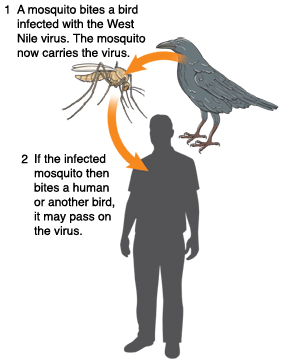West Nile Virus
West Nile Virus
What is West Nile virus?
West Nile virus is an illness that mainly affects birds. But an infected mosquito can spread it to people and other animals. This happens after the mosquito bites a bird infected with West Nile virus. West Nile virus occurs throughout the U.S. But not all mosquitoes carry the virus. And most people who are infected never get sick. Older adults and people with weakened immune systems are more likely to have mild to severe symptoms. There is no vaccine to protect against West Nile virus, so the best way to prevent infection is to avoid mosquito bites.
How does West Nile virus spread?
West Nile virus is spread by mosquitoes. When a mosquito bites a sick bird, the virus settles in the mosquito’s saliva. It can then spread easily to the next person or animal the mosquito bites.
What are the symptoms of West Nile virus?
Most people with West Nile virus have no symptoms and never know they’ve been infected. Others have a mild illness called West Nile fever that lasts just a few days. West Nile fever seems like the flu, with symptoms that may include:
Fever
Headache
Muscle aches
Tiredness
Rash
Vomiting or diarrhea
How is West Nile virus diagnosed?
Healthcare providers first ask about recent mosquito bites and evaluate current symptoms. If West Nile is suspected, a sample of blood or spinal fluid is sent to a lab to test for antibodies the immune system makes against the viral infection.
How is West Nile virus treated?
There is no specific treatment or vaccine to prevent West Nile virus, and most people recover fully without treatment. Over-the-counter medicines for pain or fever may be used as directed. When symptoms are severe, hospital care may be needed.
How can West Nile virus be prevented?
The best way to prevent infection is to avoid mosquito bites. To do this:
If possible, stay indoors when mosquitoes are most active.
During mosquito season, wear socks and shoes, long-sleeved shirts, and long pants. Loose-fitting, light-colored clothing is best.
Apply mosquito spray or repellent to exposed skin. Spraying the outside of your clothing provides extra protection. Use a repellent that contains DEET or one that has oil of lemon eucalyptus, which comes from plants. Always follow the directions on the labels.
Don’t use DEET on infants younger than 2 months old. Instead, you can use oil of lemon eucalyptus and cover your child’s stroller or playpen with mosquito netting.
Don’t apply any type of repellent to children’s hands. (Young children tend to put their hands in their mouths.)
To help reduce mosquitoes in your yard and neighborhood:
Remove outdoor items that can collect water, since that is where mosquitoes breed. For example, get rid of old tires and empty cans, and flower pots.
Change water in birdbaths at least once a week. Clean a pet’s outdoor water bowl every day.
Drain unused swimming pools and remove collected water from pool covers.
Clean clogged gutters.
Install or repair door and window screens.
Report any dead birds to your local or state health department.
When to seek medical care
Contact your healthcare provider, or 911 for severe symptoms, if you have any of the following:
Severe headache
Stiff neck
Fever of 100.4°F (38°C) or higher
Confusion
Uncontrollable muscle movements (tremors)
Loss of the ability to move part of the body (paralysis)
Updated:
March 21, 2017
Reviewed By:
Lentnek, Arnold, MD,Sather, Rita, RN
